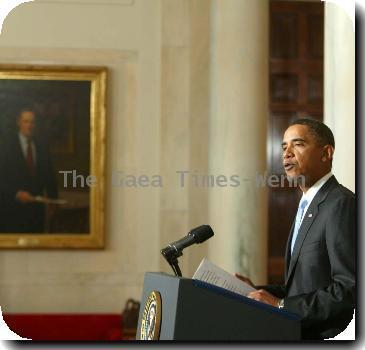In marathon talks, Obama and Democrats make hurry-up bid for final health care legislation
By Erica Werner, APWednesday, January 13, 2010
Obama, Democrats hold lengthy talks on health care
WASHINGTON — Pushed by President Barack Obama, senior Democratic lawmakers plunged into marathon talks at the White House on Wednesday in a hurry-up bid for agreement on overdue health care legislation.
“We made very substantial progress in coming together. Prospects of reaching agreement between the Senate and the House are better than they were 24 hours ago. We’re getting close,” House Majority Leader Steny Hoyer, D-Md., said after the daylong talks finally ended well after sundown.
No final deal was reached. Lawmakers left the White House while their aides stayed on to continue negotiating, with the talks to resume Thursday. The White House wants Obama to sign a bill in time for the State of the Union address next month.
The House and Senate have passed different versions of the measure, which Obama wants to expand health coverage to millions who lack it, end insurance company practices such as denying coverage on the basis of pre-existing medical conditions and slow the rate of growth of medical costs overall.
Hoyer and others said the day’s talks ranged widely over numerous areas of disagreement between the House and Senate. A key point was Obama’s demand for a tax on high-cost insurance plans, a proposal designed to slow the inexorable rise in health care costs. House Democrats oppose the idea. So, too, does organized labor, and some union leaders were also at the White House during the day, although it was not clear whether they met with lawmakers.
The unusually long meeting of House Speaker Nancy Pelosi, D-Calif., Senate Majority Leader Harry Reid, D-Nev., and other senior lawmakers — it began at midmorning and was still going at sunset — underscored the urgency they and Obama felt about completing legislation on which they have staked so much.
The president’s personal commitment in time was extraordinary.
Officials said he ducked in and out of the meeting with top Senate and House Democrats in the Cabinet Room throughout the day. Lawmakers shed their cell phones and Blackberries, standard procedure for a meeting in the room they occupied.
Numerous congressional aides were stationed in the Roosevelt Room down the hall, summoned to the negotiating table as the talks turned to their areas of expertise.
The House and Senate passed the bills with just one Republican vote and the GOP was not invited to the White House talks.
The proposed tax on insurance plans aside, the two sides worked for middle ground on the overall cost of the legislation and the size and extent of subsidies that would go to lower-income Americans who need help in paying for insurance.
The subsidies in the House bill are more generous than in the Senate measure, and it appeared lawmakers were in search of additional money.
Susan Feeney, spokesman for the American Health Care Association, said White House and Senate officials recently have asked the nursing home industry to agree to additional concessions. The industry already has agreed to a reduction in projected Medicare payments of $14.6 billion over a decade. It was not clear whether similar approaches had been made to drug makers, hospitals and other industry groups that signed agreements months ago.
After largely deferring to lawmakers on details of the legislation, Obama has weighed in more forcefully in recent days — not always to lawmakers’ liking — and the meeting at the White House appeared to be part of that trend.
“He’s given his opinions. … Congress is an independent body but we’re very interested in what the president’s views are,” Hoyer said.
Officials have said that numerous major issues were unresolved, some but not all awaiting a decision on how much money was available to defray the cost of health coverage for lower-income families who lack it.
The House approved an income tax surcharge on the wealthy, but that is expected to be jettisoned. Unclear was the fate of the proposed tax on high-cost insurance plans, and the details of a Senate-approved payroll tax increase on the wealthy.
Union officials familiar with the negotiations said the White House would like a deal on the high-cost insurance plan tax by Friday. Options being considered to lessen the impact on union members included raising the threshold at which the tax would be levied — it’s $23,000 for family plans in the Senate-passed bill — and exempting collective bargaining agreements negotiated prior to 2013 from the tax.
Under that scenario the tax wouldn’t hit until union contracts were renegotiated, delaying its impact on most union health plans until perhaps 2015 or 2016. The labor officials spoke on condition of anonymity because of the sensitivity of negotiations.
There were differences, as well, on the details of a proposed new federally regulated system in which consumers could shop for private insurance coverage. The House wants a single national exchange as a way of toughening review of insurance company practices. The Senate bill calls for a state-by-state approach.
One large issue is scarcely in doubt. A House-passed proposal for a government-backed insurance option was widely viewed as dead, the victim of opposition from moderate Senate Democrats whose votes are essential to the bill’s passage.
The lawmakers went to the White House as Democrats considered the once-unthinkable — that a special election in Massachusetts could result in a Republican victory that effectively would doom the health care legislation.
The state is the most solidly Democratic in the country, and the winner of the race will succeed the late Sen. Edward M. Kennedy, a career-long champion of universal health care. Despite their built-in advantages, Democrats betrayed signs of nervousness that their candidate, Martha Coakley, could not take victory for granted.
She has pledged to vote for the health care bill if elected. Her opponent, Scott Brown, has vowed to become the 41st Republican opponent, enough to uphold a filibuster that would send the legislation to defeat.
With polls showing public support for Obama’s health care effort slowly dropping, House Republican leader John Boehner of Ohio told GOP lawmakers that they could still sink the legislation. Republican leaders said they believed dozens of House Democrats who supported the initial bill might feel pressure to abandon the final version because of potential changes in provisions on abortion, Medicare cuts and federal Medicaid aid to states.
“The bottom line is, I believe we can beat this bill,” Boehner told House Republicans in a closed-door meeting, according to his aides. “The American people are with us.”
Associated Press writers David Espo, Alan Fram, Ricardo Alonso-Zaldivar, Sam Hananel, Ben Feller and Mark S. Smith contributed to this report.
Tags: Barack Obama, District Of Columbia, Government Programs, Government Regulations, Government-funded Health Insurance, Health Care Industry, Health Care Reform, Industry Regulation, Labor Issues, North America, Personnel, Political Issues, Political Organizations, Political Parties, Sports, Track And Field, United States, Washington




